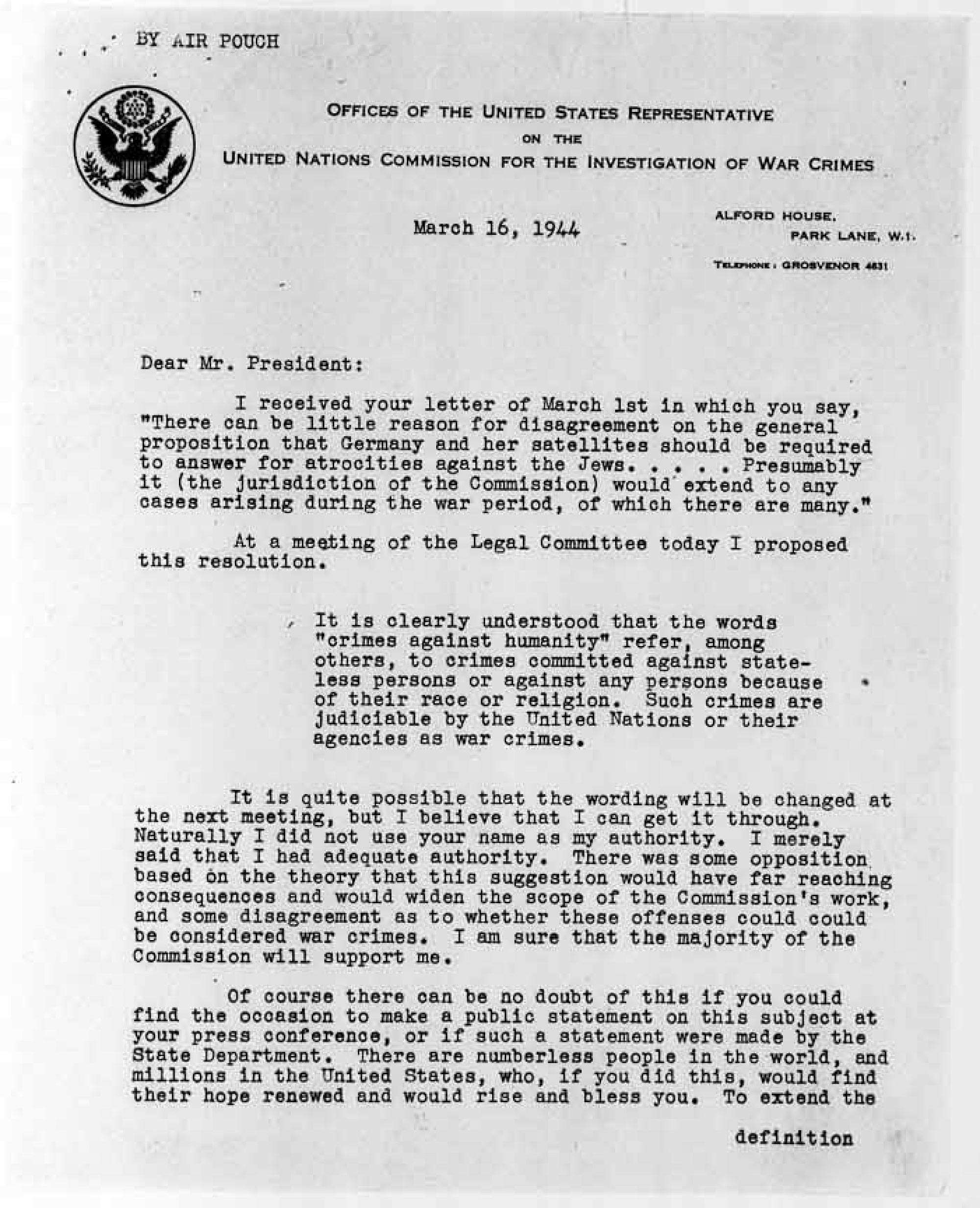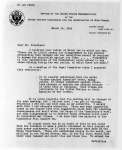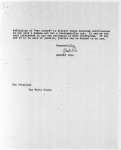Letter from Herbert Pell to President Franklin Roosevelt About "Crimes Against Humanity"
3/16/1944
Add to Favorites:
Add all page(s) of this document to activity:

Add only page 1 to activity:
Add only page 2 to activity:
Herbert Pell, U.S. representative to the United Nations Commission for the Investigation of War Crimes, sent this letter to President Franklin Roosevelt in reply to a letter he received from Roosevelt.
Pell explained his proposal to the U.N. to use the term "crimes against humanity" instead of "war crimes" for "crimes committed against stateless persons or against any persons because of their race or religion." He explained that "to extend the definition of 'war crimes' to protect those helpless unfortunates is not only a humane act but a statesmanlike one. To say we are only interested in our own nationals is mere chaffering. If anyone is to be sure of justice, justice can be denied to no one."
The United Nations War Crimes Commission (UNWCC, also known as the United Nations Commission for the Investigation of War Crimes) was established in 1943 by agreement of representatives of Australia, Belgium, Canada, China, Czechoslovakia, Greece, India, Luxembourg, the Netherlands, New Zealand, Norway, Poland, the Union of South Africa, the United Kingdom, the United States, Yugoslavia, and the French Committee of National Liberation. UNWCC members submitted information to UNWCC on war crimes allegedly committed against their respective nationals. UNWCC, in turn, determined whether enough evidence for a case existed and periodically reported its findings to the member governments. UNWCC also prepared and circulated lists of war criminals among the member governments.
Pell explained his proposal to the U.N. to use the term "crimes against humanity" instead of "war crimes" for "crimes committed against stateless persons or against any persons because of their race or religion." He explained that "to extend the definition of 'war crimes' to protect those helpless unfortunates is not only a humane act but a statesmanlike one. To say we are only interested in our own nationals is mere chaffering. If anyone is to be sure of justice, justice can be denied to no one."
The United Nations War Crimes Commission (UNWCC, also known as the United Nations Commission for the Investigation of War Crimes) was established in 1943 by agreement of representatives of Australia, Belgium, Canada, China, Czechoslovakia, Greece, India, Luxembourg, the Netherlands, New Zealand, Norway, Poland, the Union of South Africa, the United Kingdom, the United States, Yugoslavia, and the French Committee of National Liberation. UNWCC members submitted information to UNWCC on war crimes allegedly committed against their respective nationals. UNWCC, in turn, determined whether enough evidence for a case existed and periodically reported its findings to the member governments. UNWCC also prepared and circulated lists of war criminals among the member governments.
Transcript
BY AIR POUCHOFFICES OF THE UNITED STATES REPRESENTATIVE
ON THE
UNITED NATIONS COMMISSION FOR THE INVESTIGATION OF WAR CRIMES
[to the left is the Great Seal of the United States]
ALFORD HOUSE,
PARK LANE. W.1.
TELEPHONE: GROSVENOR 4631
March 16, 1944
Dear Mr. President:
I received your letter of March 1st in which you say, "There can be little reason for disagreement on the general proposition that Germany and her satellites should be required to answer for atrocities against the Jews. . . . . Presumably it (the jurisdiction of the Commission) would extend to any cases arising during the war period, of which there are many."
At a meeting of the Legal Committee today I proposed this resolution.
It is clearly understood that the words "crimes against humanity" refer, among others, to crimes committed against state-less persons or against any persons because of their race or religion. Such crimes are judiciable by the United Nations or their agencies as war crimes.It is quite possible that the wording will be changed at the next meeting, but I believe that I can get it through. Naturally I did not use your name as my authority. I merely said that I had adequate authority. There was some opposition based on the theory that this suggestion would have far reaching consequences and would widen the scope of the Commission's work, and some disagreement as to whether these offenses could could [sic] be considered war crimes. I am sure that the majority of the Commission will support me.
Of course there can be no doubt of this if you could find the occasion to make a public statement on this subject at your press conference, or if such a statement were made by the State Department. There are numberless people in the world, and millions in the United States, who, if you did this, would find their hope renewed and would rise and bless you. To extend the
definition
definition of "war crimes" to protect these helpless unfortunates is not only a humane act but a statesmanlike one. To say we are only interested in our own nationals is mere chaffering. If any one is to be sure of justice, justice can be denied to no one.
Respectfully,
[illegible] Pell [signature]
HERBERT PELL
The President
The White House.
This primary source comes from the Collection FDR-FDRPSF: President's Secretary's File (Franklin D. Roosevelt Administration).
National Archives Identifier: 16621050
Full Citation: Letter from Herbert Pell to President Franklin Roosevelt About 'Crimes Against Humanity'; 3/16/1944; War Crime Commission; Subject Files, 1933 - 1945; Collection FDR-FDRPSF: President's Secretary's File (Franklin D. Roosevelt Administration); Franklin D. Roosevelt Library, Hyde Park, NY. [Online Version, https://docsteach.org/documents/document/pell-fdr, April 19, 2024]Rights: Public Domain, Free of Known Copyright Restrictions. Learn more on our privacy and legal page.





